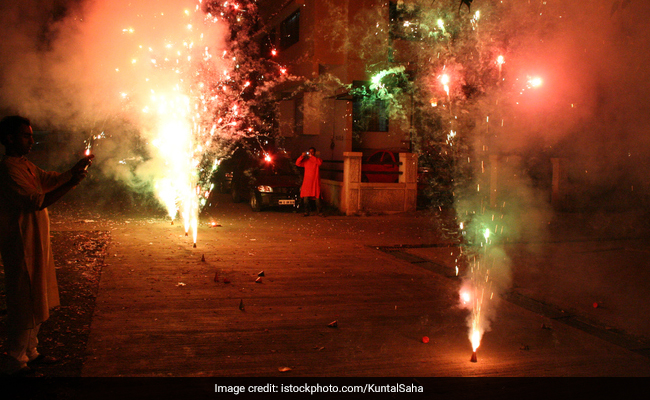Highlights
- There will also be a ban on online sale/delivery of firecrackers in Delhi
- The restriction on firecrackers will remain in force till January 1, 2023
- Action plan to be drawn up with Delhi Police, DPCC & Revenue Department
New Delhi: Delhi government has extended a complete ban on the sale and use of firecrackers till January 1, 2023, in the national capital, informed Environment Minister Gopal Rai said on Wednesday. The Delhi Government has extended the ban on manufacturing, storing, selling and bursting of firecrackers in continuation of last year’s directive. This year, the government has also decided to ban online sales and delivery of firecrackers. Taking to Twitter, Rai further said that an action plan will be drawn up with the Delhi Police, Delhi Pollution Control Committee (DPCC) and Revenue Department to ensure strict enforcement of the ban.
This time there will also be a ban on online sale/delivery of firecrackers in Delhi. This restriction will remain in force till January 1, 2023. An action plan will be drawn up with Delhi Police, DPCC and Revenue Department for strict enforcement of the ban. In order to save people from the danger of pollution in Delhi, like last year, this time also the production, storage, sale and use of all types of firecrackers are being completely banned so that people’s lives can be saved,” he added.
दिल्ली में लोगों को प्रदूषण के खतरे से बचाने के लिए पिछले साल की तरह ही इस बार भी सभी तरह के पटाखों के उत्पादन, भंडारण, बिक्री और उपयोग पर पूरी तरह प्रतिबंध लगाया जा रहा है, तांकि लोगों की जिंदगी बचाई जा सके।
— Gopal Rai (@AapKaGopalRai) September 7, 2022
Keeping in view the dangerous condition of Delhi’s air pollution during Diwali for the last three years, last year too the government imposed a complete ban on the storage, sale, and use of all types of firecrackers.
Also Read: Over 99% Of India’s Population Breathes Air That Exceeds WHO’s PM2.5 Guidelines: Report
Taking to Twitter, Kejriwal had said,
In view of the dangerous condition of Delhi’s pollution during Diwali for the last 3 years, like last year, a complete ban is being imposed on the storage, sale and use of all types of firecrackers. So that people’s lives can be saved
The government had also launched the ‘patakhe nahi diye jalao’ campaign to create awareness. Back in 2020, the Chief Minister had also appealed to traders, not to stock crackers to avoid losses that they had to incur due to the late imposition of the ban.
In 2020, the National Green Tribunal (NGT) had imposed a total ban on the sale or use of all kinds of firecrackers in the National Capital Region from November 9 midnight to November 30 midnight. Diwali will be celebrated in the last week of October this year.
Air pollution had risen in the winter months in Delhi in recent years due to excessive use of firecrackers and the burning of stubble by farmers in neighbouring states, following which the Kejriwal government had banned use of firecracker.
Also Read: 106 Deaths Per Lakh Population In Delhi Attributable To PM2.5 Pollution: Report
(This story has not been edited by NDTV staff and is published from a syndicated feed.)
NDTV – Dettol have been working towards a clean and healthy India since 2014 via the Banega Swachh India initiative, which is helmed by Campaign Ambassador Amitabh Bachchan. The campaign aims to highlight the inter-dependency of humans and the environment, and of humans on one another with the focus on One Health, One Planet, One Future – Leaving No One Behind. It stresses on the need to take care of, and consider, everyone’s health in India – especially vulnerable communities – the LGBTQ population, indigenous people, India’s different tribes, ethnic and linguistic minorities, people with disabilities, migrants, geographically remote populations, gender and sexual minorities. In wake of the current COVID-19 pandemic, the need for WASH (Water, Sanitation and Hygiene) is reaffirmed as handwashing is one of the ways to prevent Coronavirus infection and other diseases. The campaign will continue to raise awareness on the same along with focussing on the importance of nutrition and healthcare for women and children, fight malnutrition, mental wellbeing, self care, science and health, adolescent health & gender awareness. Along with the health of people, the campaign has realised the need to also take care of the health of the eco-system. Our environment is fragile due to human activity, which is not only over-exploiting available resources, but also generating immense pollution as a result of using and extracting those resources. The imbalance has also led to immense biodiversity loss that has caused one of the biggest threats to human survival – climate change. It has now been described as a “code red for humanity.” The campaign will continue to cover issues like air pollution, waste management, plastic ban, manual scavenging and sanitation workers and menstrual hygiene. Banega Swasth India will also be taking forward the dream of Swasth Bharat, the campaign feels that only a Swachh or clean India where toilets are used and open defecation free (ODF) status achieved as part of the Swachh Bharat Abhiyan launched by Prime Minister Narendra Modi in 2014, can eradicate diseases like diahorrea and the country can become a Swasth or healthy India.
[corona_data_new]




























